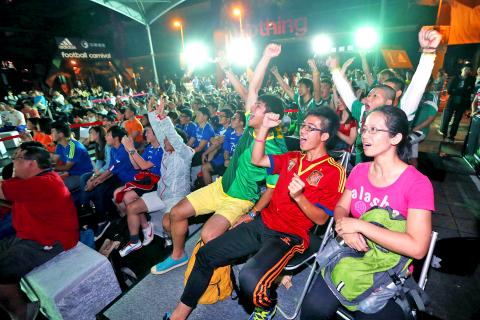Officials and lawyers for ELTA TV and ERA TV met for legal proceedings and to present their case yesterday, as the Taipei District Court opened its hearing on the World Cup broadcast dispute, which could affect millions of viewers.
Focused on sports programming, ELTA holds the exclusive broadcast rights in Taiwan for the World Cup, in a deal signed with FIFA, the soccer’s world governing body.
ELTA said that “there have been serious violations by ERA TV,” and if the situation continues, “FIFA may cut off the TV signal feed for all of Taiwan.”

Photo: CNA
If that happens, ELTA said everyone would lose: the public, soccer fans and broadcasting media companies, according to the company’s statement released on Sunday.
When contacted by the Taipei Times, a FIFA media official confirmed yesterday that FIFA is now entering discussions with ELTA on the situation to protect its media rights.
“We are in close discussion with ELTA, FIFA’s broadcast partner in Taiwan, to safeguard the protection of media rights. FIFA treats any unauthorized activities, should they be the case, extremely seriously and we work hard with our Media Rights Licensees to protect the integrity of FIFA’s media rights program,” a FIFA media officer said in a statement.
“The integrity of FIFA’s media rights agreements is crucial to protect the resources that FIFA needs to fulfill its core mission of investing in football development programs,” the FIFA statement said.
ELTA is the exclusive rights holder in Taiwan for this year’s FIFA World Cup, with the agreement including broadcasting on TV, Internet, radio and mobile devices. The agreement includes a partnership with telecommunications firm Chunghwa Telecom, which has the online streaming rights for mobile devices and computers.
Subsequent to acquiring the FIFA agreement, ELTA entered into an agreement with ERA TV in which authorization was given for ERA to broadcast the games on its TV channels, but not on Digital Cable TV, which has wide coverage and millions of subscriptions by households in Taiwan.
According to ELTA officials, ERA violated the deal by providing the World Cup signal feed to Kbro, a cable systems operator affiliated with ERA, and to other cable companies to screen the games for digital cable TV channels across Taiwan.
“ERA has knowingly breached the broadcast agreement, and has made profits on this illegal action,” an ELTA spokesperson said.
In response, ERA said it had followed the terms of the agreement to legally provide the feed for cable system operators, “to protect the rights of Taiwan’s viewing public.”
“This impacts on the public and the ERA’s media responsibility to our society. ELTA’s threat to cut off game-feed signals disregards the public’s rights to be able to watch the games of important international tournaments,” a statement issued by ERA said on Sunday.
“Because the action by ELTA to cut off signals will seriously affect the viewing public’s interest, ERA will at all costs stand together with the public, to defend Taiwanese viewers’ right to watch the 2014 World Cup games. However, we will continue dialogue and negotiations with ELTA to resolve the dispute,” the statement said.
Some in Taiwan’s online communities endorsed ERA’s stance and said that people’s rights to watch the World Cup games on cable TV must be upheld, and that it is in the best interests of promoting the game in this country.
A majority of netizens supported ELTA, as many said ERA used loopholes and devious means to circumvent the agreement, and had contravened legal means of media business practices.

Beijing could eventually see a full amphibious invasion of Taiwan as the only "prudent" way to bring about unification, the US Department of Defense said in a newly released annual report to Congress. The Pentagon's "Annual Report to Congress: Military and Security Developments Involving the People's Republic of China 2025," was in many ways similar to last year’s report but reorganized the analysis of the options China has to take over Taiwan. Generally, according to the report, Chinese leaders view the People's Liberation Army's (PLA) capabilities for a Taiwan campaign as improving, but they remain uncertain about its readiness to successfully seize

Taiwan is getting a day off on Christmas for the first time in 25 years. The change comes after opposition parties passed a law earlier this year to add or restore five public holidays, including Constitution Day, which falls on today, Dec. 25. The day marks the 1947 adoption of the constitution of the Republic of China, as the government in Taipei is formally known. Back then the Chinese Nationalist Party (KMT) governed China from Nanjing. When the KMT, now an opposition party in Taiwan, passed the legislation on holidays, it said that they would help “commemorate the history of national development.” That

Taiwan has overtaken South Korea this year in per capita income for the first time in 23 years, IMF data showed. Per capita income is a nation’s GDP divided by the total population, used to compare average wealth levels across countries. Taiwan also beat Japan this year on per capita income, after surpassing it for the first time last year, US magazine Newsweek reported yesterday. Across Asia, Taiwan ranked fourth for per capita income at US$37,827 this year due to sustained economic growth, the report said. In the top three spots were Singapore, Macau and Hong Kong, it said. South

Snow fell on Yushan (Jade Mountain, 玉山) yesterday morning as a continental cold air mass sent temperatures below freezing on Taiwan’s tallest peak, the Central Weather Administration (CWA) said. Snowflakes were seen on Yushan’s north peak from 6:28am to 6:38am, but they did not fully cover the ground and no accumulation was recorded, the CWA said. As of 7:42am, the lowest temperature recorded across Taiwan was minus-5.5°C at Yushan’s Fengkou observatory and minus-4.7°C at the Yushan observatory, CWA data showed. On Hehuanshan (合歡山) in Nantou County, a low of 1.3°C was recorded at 6:39pm, when ice pellets fell at Songsyue Lodge (松雪樓), a